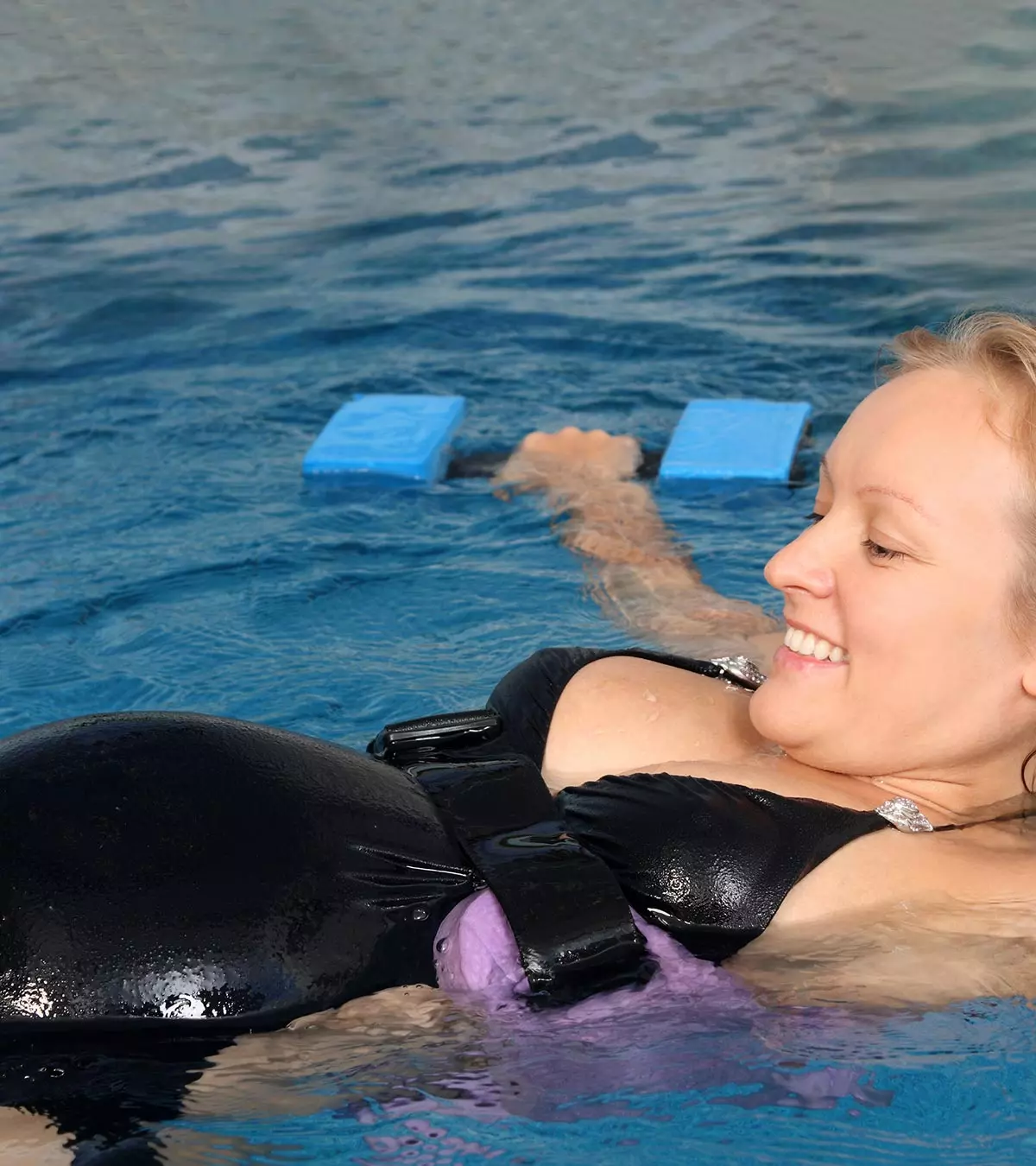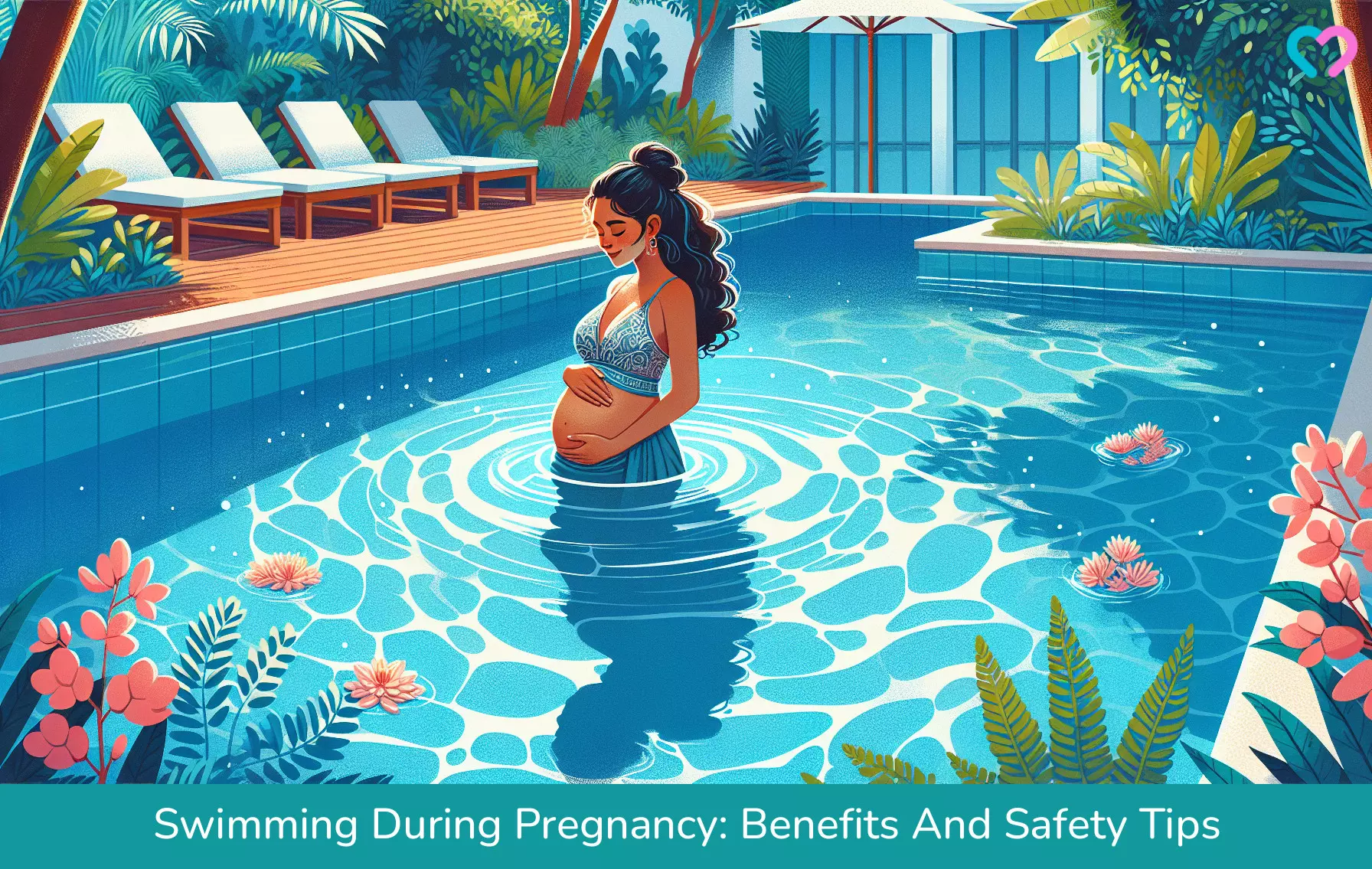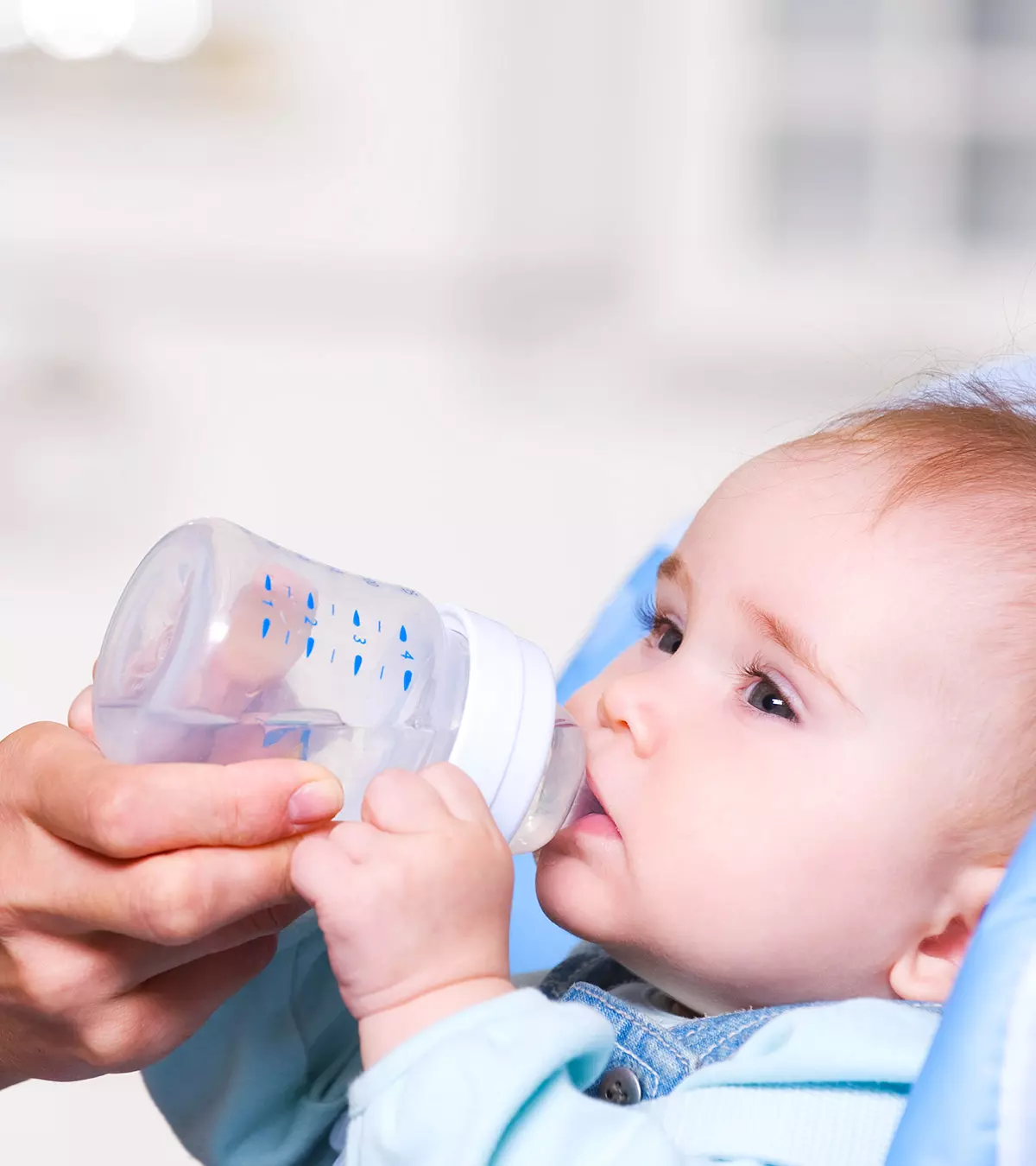
Image: ShutterStock
Swimming during pregnancy is an excellent way for full-body exercise that aids in physical and mental relaxation. You may wish to continue swimming in pregnancy if you are regular at it. However, if you are concerned about the safety of swimming as a part of your prenatal fitness regimen, read on. This post helps you decide if this activity is fit to be a part of your physical activities during pregnancy or not.

Key Pointers
- Consult with your doctor before swimming during pregnancy.
- Swimming can help with relaxation, swelling and pain relief, improve cardiovascular health, correct the baby’s position, and improve delivery.
- Backstroke should be avoided in the third trimester of pregnancy.
- Maintain steady breathing for continuous oxygen supply to the baby.
- Stop swimming if experiencing lower abdominal pain, vaginal spotting, fluid discharge, uterine contractions, irregular heartbeat, lightheadedness, or dizziness.
Is Swimming Safe During Pregnancy?
Yes, swimming is safe during pregnancy provided you take some precautionary measures (1). It helps you remain fit and feel better with the progressing body changes.
However, check with your healthcare provider, midwife or physiotherapist before you start swimming if it is new to you or you have a high-risk pregnancy to ensure optimum prenatal care.
 Quick tip
Quick tipWhat Are The Benefits Of Swimming?
Swimming is a form of aerobic exercise for strength training and pain rehabilitation. The various advantages of swimming during pregnancy are given below.
1. Provides relaxation

Swimming balances cardiovascular and muscular strength, and thus, relieves you from stress. Like any other exercise, it stimulates the body to release endorphinsiHormones released by the brain during pleasurable activities to relieve stress and pain and promote a feeling of well-being. , which may help in lowering the perception of pain and give a positive feeling about your pregnancy.
2. Relieves swelling and pain
The growing uterus puts pressure on the body. But the natural buoyancy property of the water makes you feel light and weightless when you are swimming. It is helpful in providing joint pain relief for those suffering from swollen joints and back pain as swimming strengthens the muscles around these affected joints and ligaments (2).
3. Improves cardiovascular fitness
Stimulating the heart rate for a short time keeps the heart healthy. Swimming is a cardiovascular exercise that improves lung capacity and allows you to breathe easily (3). This can also contribute to your endurance in labor and reduce the chances of exhaustion.
4. Tones your body
Swimming involves groups of muscles in arms and legs and improves muscle tone. As you tend to gain weight during pregnancy, the muscles might lose their endurance, which could be regained by swimming (4). Toning your muscles by hydrotherapy in pregnancy can also reduce the length of your labor as your contractions can be more effective if your muscles are toned.
5. Protects from overheating

Your body temperature is naturally higher during pregnancy due to the increased blood supply to your skin, and also because of the heat generated by the baby’s metabolism. Swimming helps combat the heat and maintain a comfortable internal body temperature (5).
6. Helps baby take the right position
Swimming is believed to correct the baby’s position. It is found that swimming encourages breechiThe presentation of the unborn baby where the lower part of their body is positioned to come out of the womb first. babies to turn as the belly becomes lighter in water and allows your body to align naturally (6). This makes swimming one of the best pregnancy exercises, aiding in optimal fetal positioning.
 Research finds
Research finds7. Prevents morning sickness
Swimming, especially in cold water, gives you quick relief from nausea and morning sickness that are very common in early pregnancy (7).
8. Improves labor and delivery
Aquatic exercises, such as swimming, improve muscle tone, and increase endurance too, both of which are very helpful in pushing the baby out. Swimming also helps to keep your hip muscles stretched and flexible, which can also help labor to progress quicker and more efficiently.
Obstetrician, gynecologist, and urogynecologist Michael Tahery opines, “I’m such an advocate for swimming during pregnancy because swimming consistently helps maintain muscle and stamina, which can lead to much lower risk of needing a Cesarean section delivery. What’s more, labor goes a lot faster and easier for fit folks who exercise regularly during pregnancy, especially when they get to the stage where they have to push (16).”
9. Improves sleep

After swimming, you will feel relaxed, and therefore there is an improvement in your quality of sleep (8).
If your doctor allows, take up swimming during pregnancy. However, make sure you are following water safety measures every time you go into the water.
10. Improves mental health
According to the World Health Organization (WHO), mental health disorders such as depression are prevalent in about 10% of pregnant women and 13% of new mothers worldwide (20). Research shows that staying active during pregnancy by swimming can improve your maternal mental health and reduce the risk of you developing some postpartum mood disorders. Getting out of your home and interacting with other pregnant people during an aerobics class, aquatic therapy, or free swim can also grow your network and group of friends able to support you after your baby arrives.
Lauren Silverman, a mother, recalls her relaxing swimming experience during her pregnancy. She says, “When I was super pregnant and felt like a sack of marble stones, swimming was magical. It made me feel weightless. It also made me feel connected to the baby swimming inside of me. I probably swam far fewer laps than my baby, Gaia, swam during those 39 weeks she was in utero, but I treasured every splashy escape (i).”
11. Enhances mood and reduces anxiety
Swimming can significantly enhance mood and reduce anxiety levels in pregnant women. It promotes relaxation and the release of endorphins, which are essential for emotional well-being.

Safety Tips While Swimming During Pregnancy
According to the International Forum for Wellbeing in Pregnancy, swimming in pregnancy may have some associated risk, such as decreased body temperature, dehydration, and contact with contaminated waters (17).
The contaminants in pool water such as personal care products, sweat, urine, and feces may react with water disinfection by-products to form potentially toxic compounds that may affect the fetus (18).
Furthermore, a lack of awareness of swimming safety may also lead to injuries, especially in pregnant women who are new to the activity. Therefore, it is essential to take a few crucial steps to protect both the mother and baby. Sharing her experience, yoga practitioner Marika Tietavainen writes, “The first time in the pool with my newly acquired beachball belly accessory I actually pulled my shoulder joints, having maybe not taken into account the loosening of the joints due to the hormone relaxin released during pregnancy, and confidently executing lap upon lap of breaststrokes. That resulted in an uncomfortable night of aching shoulders and revised intensity level for the swim plan. I managed to rein myself in during subsequent weekly pool plunges while sticking to the mantra of slow and clean technique does is steady (ii).”
Therefore, follow some safety precautions while you are in the pool (9)(10).
General tips
- Find a pool near your home to avoid traveling and the resulting exhaustion.
- Check if the water in the pool is chlorinated. Chlorination helps prevent water-borne illnesses. If the water is not chlorinated or you go swimming in a lake or the ocean, try not to ingest/swallow the water (which you shouldn’t do if the water is chlorinated either. Otherwise swimming in these places is also considered safe.
- Wear comfortable and non-restrictive swimsuit.
- Use shades, flippers or floating devices. They provide support to your body when you are unable to swim.
- Be cautious while walking on slippery surfaces.
- Keep your breath steady with the right breathing techniques. Do not hold your breath as your baby requires a continuous supply of oxygen.
- Listen to your body. If you start feeling any unusual pains or lightheadedness, consult your healthcare provider.
- You might join pregnancy aqua aerobic classes organized by trained professionals.
- Drink enough water at least two hours before swimming to keep yourself hydrated when exercising. Keep a water bottle nearby during your swim to stay hydrated.
- Prefer indoor pools to open pools to avoid sun radiation and overheating. If you choose to swim in an outdoor pool, be sure to wear waterproof sunscreen and reapply every two hours.
- Take some energy-filled snacks such as a toast, fruit or a bowl of cereal with milk as it helps improve your energy levels. Eat it at least half an hour before you swim, but be careful not to eat too much as a full stomach while swimming/exercising can cause uncomfortable cramping. Also, include a post-workout snack to regain the used up energy.
 Quick tip
Quick tipSwimming Tips For The First Trimester
- You might choose to swim early in the morning if you have enough energy. It relieves you from nausea and morning sickness and keeps you energetic throughout the day.
- Swim for at least 20 minutes every day to reap the benefits.
- Use pool equipment such as a kickboard or noodle for varying water workouts.
Swimming tips for the second trimester
- You may lie down on your back and practice backstroke without risking the blood flow.
- Wear a maternity swimsuit to make swimming simple and comfortable.
Swimming tips for the third trimester
- Wear a maternity swimsuit to accommodate the growing belly.
- Use a snorkeliA plastic tube separated or integrated into a diving mask that allows a swimmer to breathe normally just under the surface of the water. to relieve pressure off your neck while you try to breathe.
- Practice breaststrokeiA style where swimmers are on their chest, not rotating their torso, and performing semicircular movements with their arms. as it lengthens chest muscles and reduces stress on the back muscles.
- Avoid backstrokes as you near the due date.
The most important safety measure is to stop swimming if your body sends you any warning signs.
 Quick fact
Quick factWarning Signs To Stop Swimming
Swimming in pregnancy may cause a reduction in blood pressure and heart rate. It might also reduce the blood flow to the uterus and uterine pressure on the diaphragm, leading to decreased oxygen intake, lowered blood glucose levels, increased body temperature, and changes in fetal activity (19). These may, at times, pose risks that require pregnant women to cease swimming. Therefore, stop swimming if you experience:
- Lower abdominal pain
- Vaginal spotting
- Fluid discharge
- Uterine contractions
- Irregular heartbeat
- Lightheadedness or dizziness
- Breathlessness
- Aches and pains
- Exhaustion
- Absence of fetal movements
Also, avoid swimming if you have a history of:
- Multiple miscarriages
- Weak cervix
- Ruptured membranes
- The placenta blocking the cervix
- Lung or heart ailment
Frequently Asked Questions
1. Is it bad to swim in cold water when pregnant?
Yes, swimming in cold water could be risky as during pregnancy, a woman’s body’s temperature regularisation system is not as effective. Swimming in very cold water could cause hypothermia, which is a sudden drop in the body’s core temperature. Hypothermia might cause severe complications (11).
2. Which stroke is the best for swimming during pregnancy?
Front crawl, freestyle, sidestroke, backstroke, and breaststroke are all suitable as long as you are comfortable.
3. Can pregnant women go swimming at the beach or in a river?
Yes, pregnant women can go swimming on the beach as long as they follow swimming safety precautions. Swimming in the rivers keeps your body cool. However, you need to ensure the water is not contaminated wherever you are swimming.
4. Does water enter the uterus while swimming?
No, water does not get inside the vagina when you swim (12).
5. Is it safe to swim in the ocean while pregnant?
Yes, you may swim in the ocean during pregnancy, but you must pay attention to the currents. It is best to have lifeguards or a family member around (13). Also, make sure you are not swimming under too warm or too cold conditions which may be potentially harmful for you and the fetal development.
Swimming in pregnancy is considered safe and an ideal form of exercise. It helps reduce stress and relieves aches and pains by strengthening muscles. Regular swimming prevents you from gaining excess weight during pregnancy, improves heart and lung functions, and results in better sleep. It may also reduce the severity of morning sickness and make childbirth easier. However, you must take care of your safety and identify signs such as weakness, abdominal pain, or vaginal discharge that make it unsafe for you to swim. It is advisable to check with your doctor before you start swimming when pregnant.
Infographic: Safety Tips For Swimming In Each Trimester
Swimming is a great low-impact workout that can assist pregnant women in reducing stress and getting rid of pregnancy-related aches and pains. However, consult your doctor before swimming when pregnant. This infographic below presents helpful advice on swimming during pregnancy. Read on!
Some thing wrong with infographic shortcode. please verify shortcode syntax
Illustration: Swimming During Pregnancy: Benefits And Safety Tips

Image: Dall·E/MomJunction Design Team
Personal Experience: Source
MomJunction articles include first-hand experiences to provide you with better insights through real-life narratives. Here are the sources of personal accounts referenced in this article.
i. Art, in utero;https://medium.com/@lrnsilverman/art-in-utero-e8044ae2581b
ii. Yoga & sport during pregnancy;
https://marika-terese-yoga.medium.com/yoga-sport-during-pregnancy-51f3f841ecb4
References
1. Juhl M et al.; Is swimming during pregnancy a safe exercise; Epidemiology (2010)
3. Exercise During Pregnancy; Hospital for Special Surgery (2009)
4. Joy Murry; Advantages and Concerns of Aquatic Exercise for Cardiovascular Rehabilitation Patients; University of Wisconsin – River Falls (2015)
4. Lacey John; Pregnancy and Childbirth; Lecture Notes, Biology 203, Human Sexuality and Reproduction; The University of Arizona (2013)
5. Keep Cool: Hot-Weather Tips for Pregnant Women; University of Rochester Medical Center (2018)
6. Breech presentation; diagnosis and management; Safer Care Victoria
7. Stacey Chillemi; Epilepsy and Pregnancy; What Every Woman with Epilepsy Should Know; page 80
8. R. Rodriguez-Blanque et al.; The influence of physical activity in water on sleep quality in pregnant women: A randomised trial; Women and Birth Journal of the Australian College of Midwives (2018)
9. Exercising During Pregnancy; University of Illinois Hospital
10. Swimming and Water Safety; The American National Red Cross (2009)
11. Antenatal Swimming; CDC
12. Swimming and Your Period: Gross or Go For It?; Penn Medicine
13. A helpful guide to swimming during pregnancy; Loma Linda University Health
14. Swimming in pregnancy; Tommy’s Pregnancy Hub
15. Vern L.Katz; Water exercise in pregnancy; Seminars in Perinatology 16. What Swimmers Should Know About Swimming While Pregnant; U.S. Masters Swimming
17. Antenatal Swimming; International Forum for Wellbeing in Pregnancy
18. Lucas A Salas et al.; Maternal swimming pool exposure during pregnancy in relation to birth outcomes and cord blood DNA methylation among private well users; Environment International
19. Swimming and Pregnancy; U.S. Masters Swimming
20. Maternal mental health; World Health Organization
Community Experiences
Join the conversation and become a part of our nurturing community! Share your stories, experiences, and insights to connect with fellow parents.
Read full bio of Rebekkah Traptow
Read full bio of Rebecca Malachi
Read full bio of Swati Patwal
Read full bio of Aneesha Amonz

















